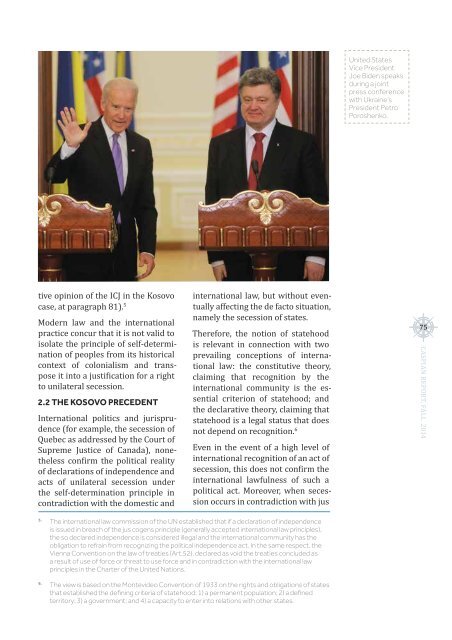You also want an ePaper? Increase the reach of your titles
YUMPU automatically turns print PDFs into web optimized ePapers that Google loves.
United States<br />
Vice President<br />
Joe Biden speaks<br />
during a joint<br />
press conference<br />
with Ukraine’s<br />
President Petro<br />
Poroshenko.<br />
tive opinion of the ICJ in the Kosovo<br />
case, at paragraph 81). 5<br />
Modern law and the international<br />
practice concur that it is not valid to<br />
isolate the principle of self-determination<br />
of peoples from its historical<br />
context of colonialism and transpose<br />
it into a justification for a right<br />
to unilateral secession.<br />
2.2 THE KOSOVO PRECEDENT<br />
International politics and jurisprudence<br />
(for example, the secession of<br />
Quebec as addressed by the Court of<br />
Supreme Justice of Canada), nonetheless<br />
confirm the political reality<br />
of declarations of independence and<br />
acts of unilateral secession under<br />
the self-determination principle in<br />
contradiction with the domestic and<br />
international law, but without eventually<br />
affecting the de facto situation,<br />
namely the secession of states.<br />
Therefore, the notion of statehood<br />
is relevant in connection with two<br />
prevailing conceptions of international<br />
law: the constitutive theory,<br />
claiming that recognition by the<br />
international community is the essential<br />
criterion of statehood; and<br />
the declarative theory, claiming that<br />
statehood is a legal status that does<br />
not depend on recognition. 6<br />
Even in the event of a high level of<br />
international recognition of an act of<br />
secession, this does not confirm the<br />
international lawfulness of such a<br />
political act. Moreover, when secession<br />
occurs in contradiction with jus<br />
75<br />
CASPIAN REPORT, FALL <strong>2014</strong><br />
5.<br />
The international law commission of the UN established that if a declaration of independence<br />
is issued in breach of the jus cogens principle (generally accepted international law principles),<br />
the so declared independence is considered illegal and the international community has the<br />
obligation to refrain from recognizing the political independence act. In the same respect, the<br />
Vienna Convention on the law of treaties (Art.52), declared as void the treaties concluded as<br />
a result of use of force or threat to use force and in contradiction with the international law<br />
principles in the Charter of the United Nations.<br />
6.<br />
The view is based on the Montevideo Convention of 1933 on the rights and obligations of states<br />
that established the defining criteria of statehood: 1) a permanent population; 2) a defined<br />
territory; 3) a government; and 4) a capacity to enter into relations with other states.










